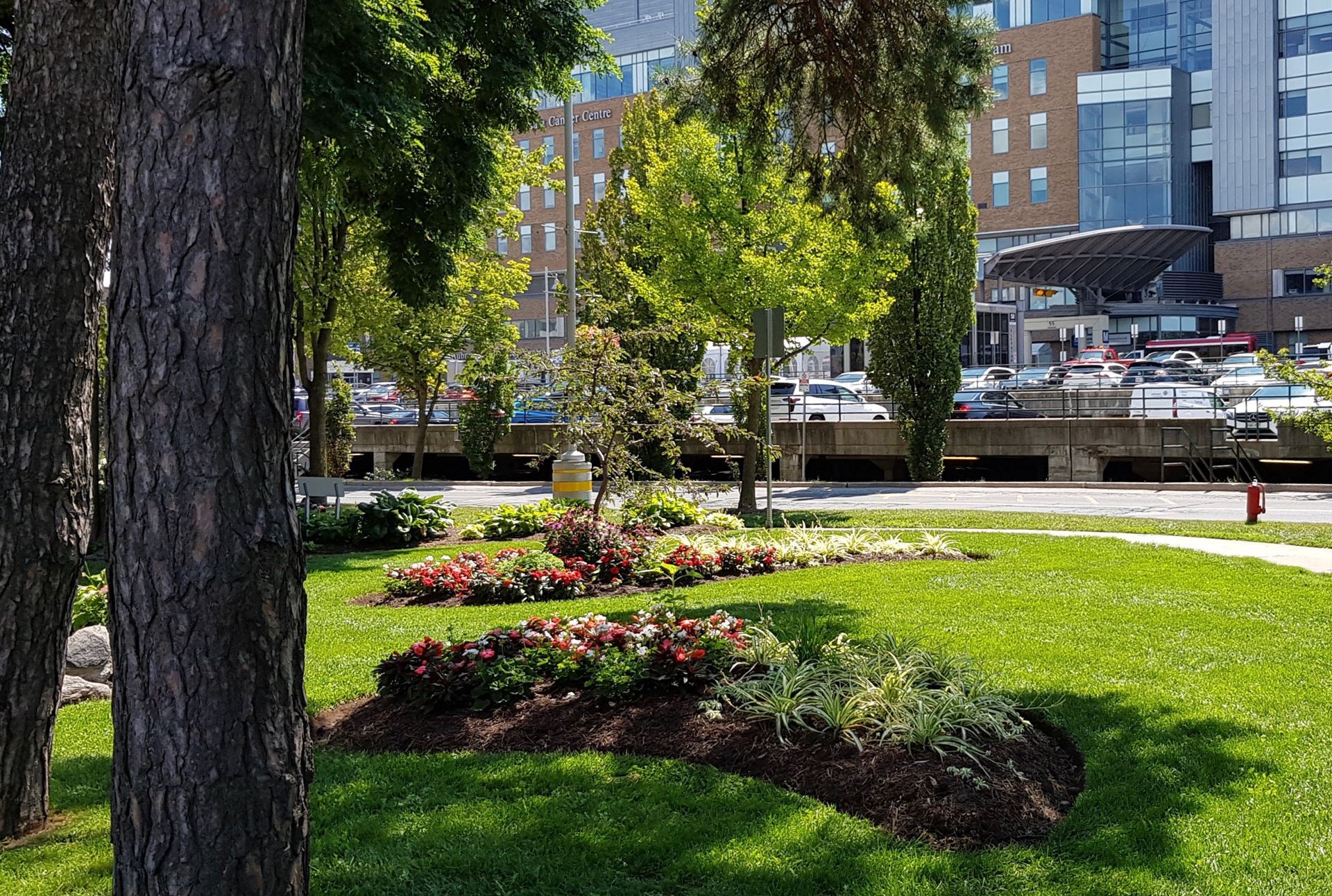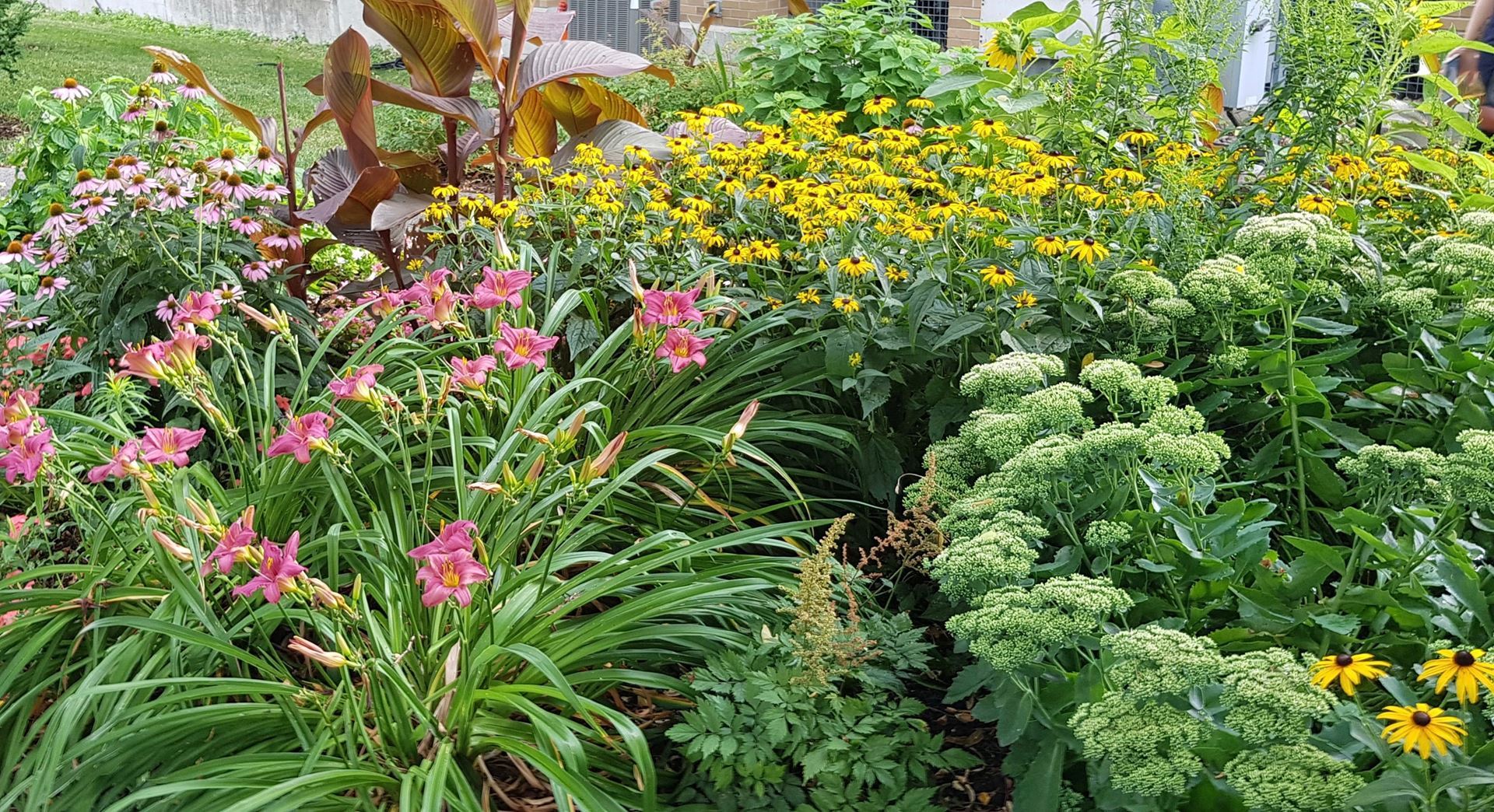- Home
- SOUL Members
- Member Profiles
- Rohan Harrison
.JPG)
Rohan Harrison Accredited Organic Land Care Practitioner Team leader, Grounds Department, Sunnybrook Health Sciences Centre Toronto, ON |
1. How and when did you become interested in horticulture and gardening?
Throughout my entire life, I have been involved in agriculture (including horticulture and gardening). Given my parental family’s involvement in commercial farming, I grew up inspired to study agriculture as a profession, focusing on agronomy (the study of plants and soil). Eventually, that love for plants and the outdoors landed me the opportunity to manage one of the more extensive government-owned farming operations. During that time, I began to delve deeper into a burgeoning area of research: the connection between healing and nature.
I transitioned to the conventional side of the lawn care industry operation in Ontario, which allowed me to garner even more appreciation for the impact plants have on our health and welfare. It was not until 2005, however, that an opportunity to be the team leader for the Grounds Department at Sunnybrook Health Sciences Centre allowed me to practice 100% organic land care. In this role, I am responsible for the day-to-day care of 100 acres of land, including 32 acres of turf and more than 4,600 trees.
Today, as a ‘Steward of Creation,’ I remain blessed to be living out one of my divine responsibilities, and I am committed to sustainable working practices that encourage biodiversity and healthier living.
2. As the lead groundskeeper at Sunnybrook Health Sciences Centre, why is it important to you to apply organic land care practices?
HEALTHCARE – Our landscape heals! Because of the relationship people have with green spaces, there is strong evidence that real or simulated views of nature have multiple impacts on our social, spiritual and physical health. However, if our green space is not healthy, it cannot provide preventative and restorative healing for people.
Sunnybrook Health Sciences Centre invests in organic horticulture that protects biodiversity and positively impacts preventative and restorative healing. Our organic land care practices provide a sustainable option for our green spaces to play a valuable role in human health and wellbeing.
Studies have found exposure to green landscapes offers hospitalized patients benefits such as:
Improved sleep and better pain management.
-
Reduction in post-operative stays. Patients with exposure to green space had shorter post-surgery stays, better emotional well-being, and fewer minor complications such as persistent nausea or headache.
-
Enhanced psychological wellbeing within minutes of exposure for patients suffering from a major depressive disorder and can be a source of vitality and personal happiness.
-
Production of positive feelings such as pleasantness and calm, while anxiety, anger, or other negative emotions diminish. Many green landscapes sustain interest and thus function as pleasant distractions that may block worrisome, stressful thoughts and promote healing.
Additionally, healthy land care practices produce healthy environments that ultimately promote healthy living and therefore contribute to a healthy society.
3. What are some of the challenges or limitations you've encountered practising ecologically-sound gardening and landscaping?
Changing the narratives and appreciation of what society considers a healthy landscape was the most significant challenge. Next was convincing others to embrace the fact that organic land care is not ‘warfare against pests, but rather the welfare of plants,’ and that land care has the potential to create beautiful, sustainable landscapes within the parameters of shrinking resources.
Another challenge was managing the patience levels of our audience because results from our organic practices were not as immediate as conventional methods, and thus not as readily appreciated.
Once we realized that soil microbes play a pivotal and determining role in the health of our plants, we took action to increase the population and health of the soil microbes. In doing so, we had results never before experienced with previous conventional practices. Like in humans, proper nutrition (soil management) is the foundation to create and maintain a healthy, environmentally-friendly and sustainable landscape – that HEALS!
4. What have been some of the opportunities or positive outcomes of incorporating organic land care at Sunnybrook Health Sciences Centre?
Every day, patients, their families and our staff use the green space around the hospital as a place of escape, reflection, enjoyment and healing.
Since adopting an organic land care program, we have realized the following benefits:
- Increase in colour: The property looks greener now, especially during the dry summer months.
- Reduction in weed populations: We have significantly reduced the weed populations ever since we incorporated compost applications in our soil fertility practices.
- Reduction in mowing frequency: Due to slower and timelier growth, we generate fewer grass clipping, making it much easier to mulch, thereby returning valuable nutrients to the soil, and also reducing noise and air pollution.
- Reduction in pest insects and diseases: Although we have no documented research findings, we have noticed a significant drop in pests such as white grubs and chinch bugs. While we still detect the presence of white grubs, our turf root system is so developed that these insects can coexist without any significant damages. Turf areas no longer display any concerning insect activity, and the turf areas are noticeably greener during the hot summer months, even without irrigation. These results reflect the benefits of applying compost as topdressing material to turf and beds in the spring.
- Increase in plant diversity: We have increased plant diversity through multi-story planting with particular emphasis on native plants and trees.
- Increase of on-site composting: We compost on-site to reduce waste, resources and materials.
- Increase in 'acceptable' wildlife: We have observed a recent increase in butterflies, birds and bees. These pollinators are excellent indicators of the health of the landscapes at Sunnybrook.
5. In what ways do you think organic land care is relevant in these times of environmental crisis such as climate change and biodiversity loss?
RESTORATION: Organic land care has the potential to positively impact our environment by restoring (creating) healthy ECOSYSTEMS that thrive year after year. This approach can restore biodiversity through addressing the population and health of our soil microbes, promotion of multi-storey planting and working with nature and the natural systems as ‘Mother Nature’ intended.
Green spaces managed with organic land care practices require less maintenance (and therefore generate less pollution), benefit wildlife and promotes the use of native plant species. Organic land care reduces pest and disease pressures, which ultimately limits the introduction of environmentally harmful chemicals.
A regenerative approach contributes to the ecosystem rather than depletes it.
 | .jpeg)
|
Photos of Sunnybrook's extensive grounds and gardens provided by Rohan Harrison


